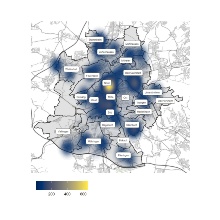Does the presence of asylum seeker centers in the neighbourhood affect attitudes toward asylum seekers?
The influx of refugees to Europe is a topic that dominates the political and media agenda. Furthermore, the installation of asylum-seeker centres (ASCs) has made asylum seekers and refugees highly visible in the everyday life of many European citizens. Drawing on theories of ethnic threat and intergroup contact, we examine how geospatial proximity to ASCs translates into threat or contact in an everyday context and how this affects attitudes toward asylum seekers. By taking advantage of a natural experiment, where the ASCs are assigned to city districts as-if at random, as well as innovating measures of outgroup exposure and geospatial proximity, we find that, although higher numbers of asylum seekers in one’s own neighbourhood are related to an increased perception of their local presence, the actual presence of asylum seekers does not lead to more negative attitudes or a greater threat perception, nor to more frequent contact. It is only when the number of asylum seekers in one’s own direct neighbourhood suddenly increases that attitudes toward asylum seekers deteriorate.
The population survey was funded from the Rectorate of the University of Stuttgart, Grant No. 24131884, as part of a research teaching project. We thank the participants of the research teaching project for their input and engagement in developing and fielding of the survey.
Elisa Deiss-Helbig
Dr.Research Fellow

Uwe Remer
Dr.Research Fellow


